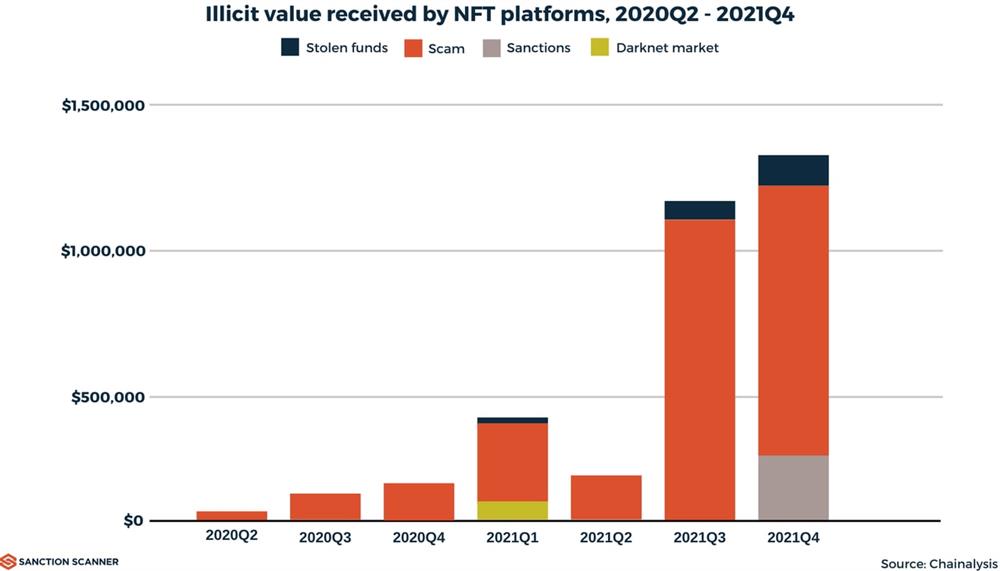There are various reasons why NFTs are questionable. ❓
Their connections to money laundering are merely another issue, but it's no different from regular art, is it not?👀
NFTs frequently grab headlines on CT✅
One day, someone is making millions by offering "digital art" as an NFT.
Then another day, a would-be NFT startup pulled a rug from under its investors and stole all of its money.
Money laundering is a thing in the NFT space🖇
It is challenging to imagine a scenario in which NFTs are not utilized in money laundering.
NFTs give a useful layer of abstraction for criminals;👇
→ are really easy to use
→ practically free at the point of service
→ come with a ton of privacy measures on top of that.
The value transferred from unauthorized addresses to NFT markets skyrocketed, topping $1M in crypto, in the 3rd quarter of 2021, the table shows.
The figure grew to nearly $1.4M in the 4th quarter
In both quarters most addresses were associated with fraud in the NFT space.📈

♻️How are NFTs used for Money laundering
NFTs carry a number of money laundering vulnerabilities that might put people & projects at risk:👇
1- Wash trading
2- Hiding identities
3- Assets & Money can't be seized
4- Hacking
🔹 Wash Trading
In NFT space, Wash trading is when the seller is partaking on both sides of the transaction to present a false impression of the value & liquidity of an item.
It is easy to wash trade with NFTs cause many NFT platforms allow users to do so confidentially.
🔹 Hiding Identities
When money is being laundered, criminals can remain anonymous by using a cryptocurrency wallet that doesn't require verification.
✔️They have the ability to transfer significant sums of money secretly from one wallet to another.
🔹Assets & Money can't be seized
In the NFT world, they may act instantaneously and can be transferred from one digital wallet to another.
🖇making it challenging for law enforcement to seize illicit assets and money.
🔹Hacking
Along with phishing and malware attacks, identity fraud, and forgeries, we also observe money laundering scenarios involving NFT
→ There are a few more moving parts to the process, & above mentioned rough outlines how NFT money laundering works.
Is it legal❓
Entirely🎯
Regular financial laws still apply even when we're talking about bitcoin assets.
It is forbidden to use wash trade to fraudulently boost the price of a product, as well as to launder the proceeds of crime using any manner.
♻️How the risks can be reduced
Ways to reduce money laundering with NFT:👇
→laying the groundwork for businesses that specialize in NFTs.
→customer two-factor authentication option execution.
→adeptly putting cybersecurity safeguards into practice
→Use of KYC application
Conclusion ✍️
The NFT Space has undergone factual growth.
Last year, the NFT market reached a global value of $42B. which, unsurprisingly, raises the NFT Marketplaces' risks
But we likely to see increasing regulation as governments worldwide try to tackle their use in ML.